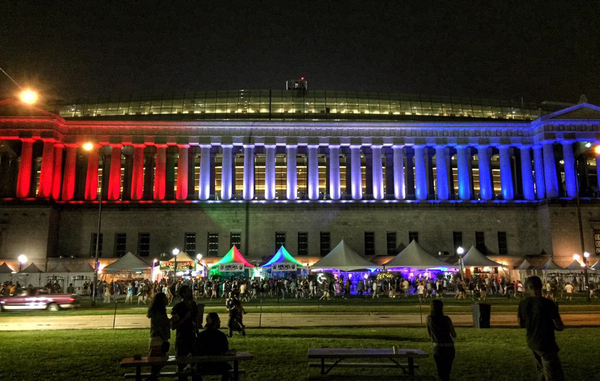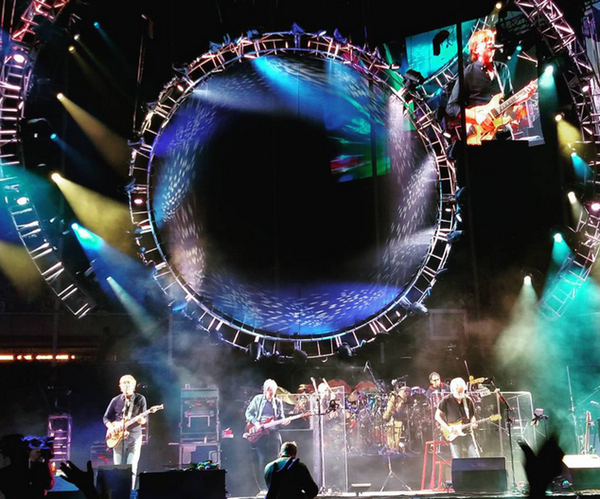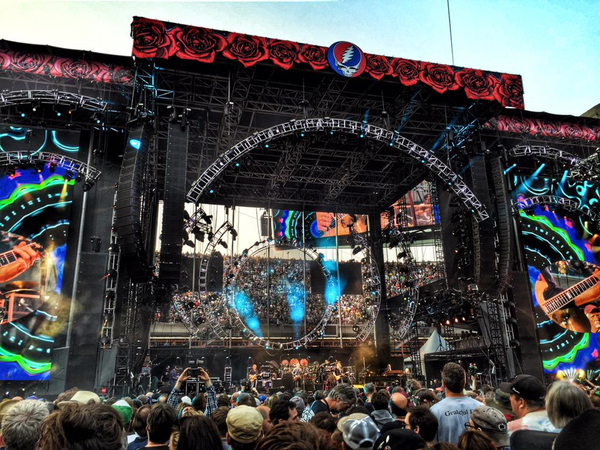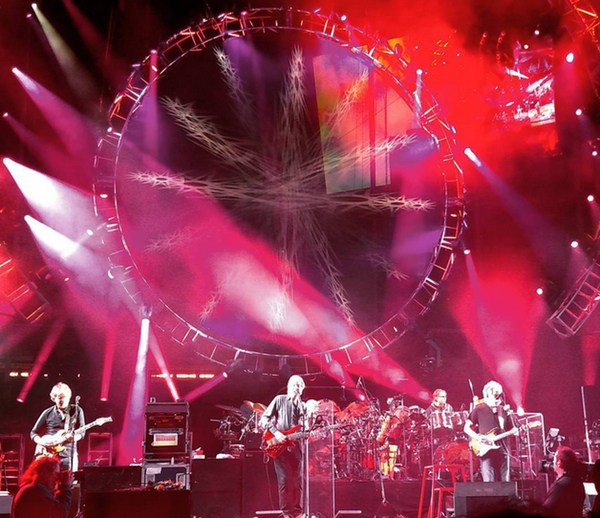FARE THEE WELL - CHICAGO 1 RECAP
Going into the Santa Clara shows last week, the Fare Thee Well lineup assembled to celebrate fifty years of the Grateful Dead was a blank slate upon which every fan could (and did, in abundance) project the story they wanted to see. This celebration was first and foremost about the profound and enduring history of the defining improvisational rock-and-roll band of our time. The question at hand was: was this going to be a pure nostalgia trip, where the music really didn’t matter? Or would the music stand on its own and honor that history in a meaningful way, in the present?

Photo by @andreanusinov
Those Santa Clara shows contained their fair share of musical enjoyment, and there were many positive moments that offered hope for Chicago. However, an honest assessment of those performances also revealed, at times, a band that suffered from wide discrepancies in preparation by individual members, an almost total lack of conversational cohesion, an absence and/or confusion about leadership roles, and an unsettling lack of ability to perform core elements of beloved songs. So as we approached the first of the final three shows by this ensemble, expectations of an amazing event remained high... while hopes for transcendent music were, let’s say, muted.
Then a funny thing happened between Santa Clara and Chicago – like the best athlete or manager, they made some critical halftime adjustments, and came out of the gates seemingly an entirely different band, one that much more closely approximated the one that we’ve assembled to celebrate.

Photo by @neddyo
“Box of Rain” bridged the twenty years since the Grateful Dead’s final performance on 7/9/95, when “Box” was the final song officially performed under that band name. It’s all a dream we dreamed, one afternoon long ago! Phil delivered the vocals with confidence and beaming pride, and we were off to a great start. An extremely slow intro jam paved the way for “Jack Straw,” with Phil sharing vocal duties with Bobby. Maintaining a tempo that was in the same ballpark of the songs as performed throughout their history was a challenge in Chicago, but by the end they had collectively pulled “Jack Straw” up by its bootstraps for a more than respectable version.
“Bertha” allowed Trey his first lead vocals of the night, and while nerves may have marred his opening line, his recovery was sweet and pure. A “Bertha” that works – or, for that matter, any performance of Grateful Dead music that works – depends on a confident lead guitarist who knows the material and can be assertive in that role. This “Bertha” showcases Trey ready, willing and able to carry that weight. “Passenger” saw Bobby in much more comfortable form than we saw during much of Santa Clara, delivering not just competent but confident vocals. Bruce Hornsby was offered a moment in “Passenger” to emerge from witness protection with a solo, a courtesy also offered to Jeff Chimenti, though both would be relegated to complementary – if often inaudible – roles for most of the gig.

Photo by @andreanusinov
“The Wheel” opened some delightful space, allowing Trey some breathing room, and for a few minutes it seemed like we were deep into a second set. “Crazy Fingers” is a difficult song to perform well even by ensembles with extensive practice, making this a somewhat bold tactical call. The band was more than up to the task, with Trey’s taking the lead vocal and finding a sweet spot despite his having never previously performed the song; Trey’s “I tried” ending vocal refrain was convincing and touching in its authenticity. “The Music Never Stopped” was a little sloppy but compensated by a collective soaring energy, Trey crushing the final solo and Bobby riffing on “never stop, never stop now!” Only a shade over an hour, but the set was totally entertaining end-to-end, rendering the issues and concerns from Santa Clara an unfortunate footnote. That was a great first set – no qualifications, not “for this lineup” or “for this era” – simply great.
A lengthy, hour-plus halftime ended a little after 9:30 local time with Phil and Bobby sharing lead vocals on “Mason’s Children”, though that was a mere prelude to “Scarlet Begonias!!” “Scarlet” was really the moment where the metaphorical keys to this ride we’re handed over to Trey – a ride that may have flipped the odometer a few times, but still has plenty left in the tank. The composed section of the song was bright, airy, hopeful, and gorgeous! This “Scarlet” extended to around fourteen minutes and crystallized so much of what Grateful Dead music does to inspire: starting with a balanced conversation, but allowing the lead guitar to shape that conversation and take flight, bringing not just the band but the audience along for a journey of adventure and discovery. An intricate yet simple web formed around Trey, who soared above yet never strayed too far from the conversation… nostalgia would have to step aside for this “Scarlet,” as this band’s magical story was witnessing a chapter in progress.
The “Fire on the Mountain” portion of the “Scarlet” -> “Fire” was somewhat less thrilling, with an abrupt transition rather than a patient melding of peanut butter and chocolate, though it did afford Bruce a turn at lead vocals. This “Fire” would be the weaker partner of the combo, but the afterglow of the “Scarlet” left few if any dissapointed. A ~twelve-minute (and seemingly rather early) “Drums” allowed room for Bill Kreutzmann and Mickey Hart to take the reigns, followed by a very short “Space.”
“New Potato Caboose” emerged from “Space” with Phil and Bobby sharing vocals, but as with the beginning of the set, this was simply the lob for the smash that would come with the “Playing In The Band.” History is replete with so many instances of “Playing” defying improvisational gravity over its 44-year life – forming the pillars of rock improv upon which an entire modern musical genre rests – that it’s almost hard to imagine the song breaking new ground in 2015. Almost, but not quite: this “Playing” has essentially four different jams, several of which were very un-”Dead”-like, proving old dogs can indeed learn new tricks. Afforded repeat opportunities to pull the plug and move on, someone would instead offer a new idea to continue the conversation. Alongside the “Scarlet,” this spectacular “Playing In the Band” formed this show’s must-hear highlights.

Photo by @neddyo
One of the themes that emerged among the “Playing” jams was “Let It Grow,” which was dusted off in earnest next. Bobby delivered the song’s vocals confidently, while Trey’s shined brightly with an increasing sense of ease in his share of leadership among the band and the crowd. For the set’s finale they went all-in, with “Help on the Way” > “Slipknot!” > “Franklin’s Tower.” Trey took the vocals on “Help” with an ease and confidence that almost demands performances in future contexts. The “Help” jam and transition to “Slipknot!” will not be lauded as examples of precision performances of these songs, but the energy was right there and filled the space of the biggest of stages. Phil took lead vocals on a “Franklin’s” that crossed the finish line for this set that exceeded all but the most unrealistically demanding expectations. A sweet and tender “Ripple” provided the encore.
Especially considering the baseline established in Santa Clara, this show was all win, and sets the balance of the weekend in an entirely more positive and hopeful light, musically, to go alongside the high spirits of gathering the tribe in such a high profile context. There has been a tremendous amount of energy devoted to the money and the tickets and the name of the band (that you can find… elsewhere), but when it comes to the music, we now appear to have an ensemble equal to the task of fulfilling dreams as a group one last time.
Are you excited? I’m excited! Have a great show... we’ll be back with more coverage tomorrow.
Comments
You must be logged in to post a comment.

 The Mockingbird Foundation
The Mockingbird Foundation
.... these kids today...
,
Spoken in a language of love.
Thank you.
While sloppy at times it was a Deadheads wet dream, and
I think it should be noted not as an afterthought or
a warmup, but a gift to their roots and the Californians
that got this whole thing started. The end of Dark Star,
and the entire Stephen were beautifully rendered.
I know I walked away that night really impressed
by the band (but not the mix, which they've fixed
apparently.
At the end of the run I think it's safe to say now that Trey wasn't the member we should have been worried about.
Overall there didn't seem to be much cohesion at all on stage for the 5 show run. Oft times the rhythm section seemed a step ahead or behind the string players and even the string players didn't seem to be totally in step.
Granted it takes years for a group to become fluid and acclimated to Grateful Dead songs but they just didn't seem very rehearsed as a group.
Still, as a moment in time, an event, it was fun & cathartic.
I think over time we'll come to understand why Phil & Bobby insisted on singing so many songs that frankly are just out of their league(that Terrapin!!!).
All mistakes aside I can say Im happy, and totally stoked on how Trey will bring this his piece of this experience into the Phish world.